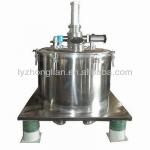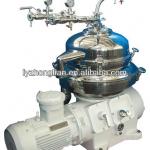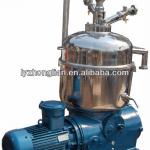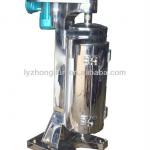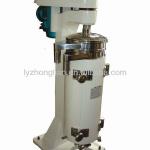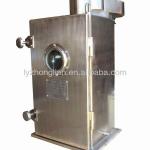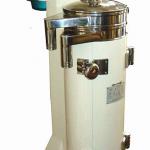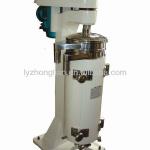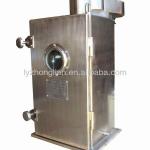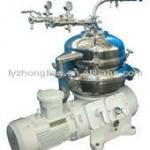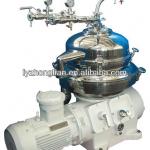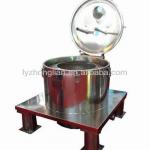Rubber Latex Centrifuge Separator Machine
| Condition:New | Type:Centrifuge | Product Type:Paint | Place of Origin:Liaoning China (Mainland) |
| Brand Name:ZL | Model Number:LTC | Voltage:220-480 | Power(W):0.4-55 |
| Weight:300kg-5000kg | Dimension(L*W*H):1000mm | Certification:ISO | Warranty:12months |
| After-sales Service Provided:Engineers available to service machinery overseas | Capacity:10L/h-10000L/h | Speed:0-30000 RPM | Centrifugal force:0-30000 g |
| Bowl diameter:40mm-700mm | Nozzles:2,3,4,5,6,8,10,12 | Volume:0.4L-200 L | Operation:Easy |
| Pressure:0.05Mpa | Motor:0.4kw-55kw | v:200kg-3000kg |
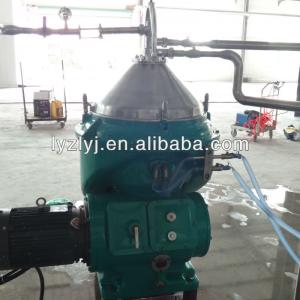
Rubber Latex Centrifuge Separator Machine
Latex Separator
Latex Centrifuge
Latex, also known as natural rubber, is the milky sap of the tropical rubber tree. The main countries
cultivating this tree are Asia, Africa and Central America. Latex is still the most important starting material in
the productionof rubber. Modern life is virtually inconceivable without this raw material, so varied are the
items for daily life wemake from it.
The process is as follows: after the rubber milk has been harvested, collected and transported to the
productionfacilities, it is first stored in large sedimentation tanks to separate off impurities. After a certain
settling period, the latex milk is passed to the separator system.
The separators separate the majority of the aqueous phase, the so-called “skim milk”, and other
contaminants from the plantation milk. The plantation milk, also known as “field latex”, contains around
30 percent latex. Afterseparation of the skim milk, the latex fraction in the concentrate increases
to over 60 percent. Once stabilizing additives have been added, the concentrate is sold as
commercially-available latex.
This product is especially good for making rubber gloves, condoms, balloons or other molded thin-walled
rubberitems.
The aqueous skim milk can still contain up to five percent latex. By adding chemicals in a treatment system
downstream of the separators, rubber can be recovered from the skim milk. The natural rubber obtained by
thismeans is sold in blocks and used for more robust rubber items, in particular car tires.
| Model | mm Diameter | r/min Speed | L/h Capacity | MPa Inlet Pressure | kW Motor Power | mm Overall size | kg Weight |
| 250 | 245 | 7300 | 2000 | ≥ 0.05 | 4 | 865×750×1100 | 500 |
| 320 | 315 | 7200 | 4000 | 5.5 | 950×900×1220 | 700 | |
| 360 | 355 | 6700 | 5000 | 7.5 | 1000×900×1300 | 800 | |
| 400 | 400 | 6500 | 8000 | 11 | 1152×1125×1352 | 1000 | |
| 500 | 530 | 5900 | 10000 | 18.5 | 1800×1400×1800 | 1500 |
Latex Centrifuge Separator
Latex Centrifuge Separator is widely used for Latex extraction. And the centrifuge is used for liquid-liquid-solid separation
and liquid-liquid separation.
Tubular centrifuge
Industrial centrifuge
High capacity centrifuge
Super centrifuge
Centrifuge with CE ISO
Our High-speed Tubular Bowl Centrifuge is widely used in a variety of biological processes from cell
harvesting and clarifying to separations of chemicals, foods, blood and pharmaceuticals.
The centrifuge is characterized by their ability to process many times the volume of their tubular bowl.
Fluid mixtures are fed into the bottom of the rapidly rotating separating chamber of the centrifuge.Solids
are retained, while liquid components are expelled from the top of the chamber through a collection tray.
For liquid-liquid separations, two collection trays are used. The retained solids cake is dry and densely
packed by the high G-forces of the High-speed Tubular Bowl Centrifuge.
The most difficult separation tasks can often involve three phases, with hardly any difference in the density
of the separate liquid phases and with the particles to be separated very small in size. In such applications,
no other technology can compete with High-speed Tubular Bowl Centrifuge technology.
The optimum size centrifuge for a given application depends on the volume and properties
of the process liquid. Typical process volumes specified for each centrifuge are approximate.
Tubular Bowl Centrifuge operate at high speed, generating up to 20,000 gravities of centrifugal force,
causing solids to collect inside the smooth bore of the stainless steel tube where they are easily recovered.
Tubular Centrifuges are an excellent replacement for many traditional filter and membrane applications due
to their high efficiency (virtually no product loss) and small footprint.
Tubular Bowl Centrifuges have two types: GF Tubular Bowl Centrifuge and GQ Tubular Bowl Centrifuge
GF Tubular Bowl Centrifuge
GF Tubular Bowl Centrifuge is for liquid-liquid-solid separation and liquid-liquid separation.
OPERATION: Centrifugal force drive the heavier fluid toward the bowl wall of the centrifuge while the lighter
fluid is displaced to the center of the centrifuge bowl.
FLOW: Fluid flow in and out of the centrifuge is continuous. In the illustration the heavier phase discharges
through the left outlet and the lighter fluid discharges through the right outlet. If any solids are present they
will be collected on the bowl wall and may be removed periodically.
The centrifuge is a high-speed centrifuge, with strong separating capacity. The bowl of the centrifuge rotates
around its axis and forms a strong centrifugal force, the centrifugal force separates a mixture of two immiscible
liquids that may contain fine suspended solids, in small quantities, heavier than either liquid.
The mixture enters the centrifuge through an inlet at the bottom of the machine, and is introduced into the
hollow cylindrical rotor which has two outlets at the top to allow discharge of the separated liquids. The bowl
of the centrifuge turns at 15000r.p.m.or higher, and generates a centrifugal force in excess of 21000times
the force of gravity. This force separates the two liquids according to their specific gravities into concentric
cylindrical layers. The lighter liquid is nearer the centre of the bowl and the heavier liquid forms the outside
layer. The lighter liquid and the heavier liquid flow out from their respective liquid outlets. At the same time
the solids are deposited against the bowl wall and the solids are cleaned out when the centrifuge stop.
GQ Tubular Bowl Centrifuge
GQ Tubular Bowl Centrifuge is for solid-liquid separation.
OPERATION: Centrifugal force cause suspended solids to migrate to the centrifuge bowl wall where they
are retained. As the fluid travels up through the bowl, solids eventually migrate to the wall and the clarified
fluid is discharged through the top center of the bowl.
FLOW: Fluid flow in and out of the centrifuge is continuous while the solids are collected on the tube wall in
a batchwise manner.
The centrifuge is a high-speed centrifuge, with strong separating capacity. The bowl of the centrifuge rotates
around its axis and forms a strong centrifugal force; the centrifugal force separates a mixture of liquid and solid.
The mixture enters the centrifuge through an inlet at the bottom of the machine, and is introduced into the
hollow cylindrical rotor which has one outlet at the top to allow discharge of the separated clarification liquid.
The bowl of the centrifuge turns at 19000r.p.m.or higher, and generates a centrifugal force in excess of
21000times the force of gravity. This force separates the mixture according to their specific gravities.
The lighter liquid is nearer the centre of the bowl and the heavier liquid forms the outside layer. The clarification
liquid flows out from its outlet at the top. At the same time the solids are deposited in the bowl and it is cleaned out
when the centrifuge is shut down.
The liquid to be separated or clarifiles is fed to the centrifuge bowl(R) through the feeding nozzle(X)
of the centrifuge bottom.One(P) or(P,L)liquid layers are formed,if the centrifuge in use is either the
clarifying type centrifuge-GQ or the separating type centrifuge-GF.The high density layer(P)occupies
the outer part of the centrifuge bowl,and the lighter one(L)lies at the inner part.The bowl wall captures
the solid(S) and the separated liquids are discharged through the collectors(R) at a continuous rate.
Tubular centrifuge is a type of decanter centrifuge operating at high speed. This type of centrifuge has
simple structure and operates reliably. Among centrifuges, this centrifuge has the highest separation
factor and best separation effect.
For the tubular centrifuge has high separation factor, few ancillary equipments, small floor space, and can
separate the materials which are hard for general centrifuges with easy operation and maintenance, the
centrifuge is widely used in industries such as blood products, bio-pharmaceuticals, TCM extraction,
health care products, fuel, food, fine chemical industry, and can be selected according to different
users'demands.
HIGH PERFORMANCE TUBULAR CENTRIFUGES
The Centrifuge is designed to operate at high speeds to generate up to 13,600 gravities of centrifugal force.
Tubular centrifuges are used for the recovery or the elimination of liquid suspended impurities, and for the
separation of two (2) non-miscible liquids of different densities. The GQ and GFP are available either as a
clarifying type or separating type of tubular centrifuge.
Clarifying Type (Solid-Liquid Separation) Centrifuge
The GQ and GF configured as a clarifying type of tubular centrifuge is designed to separate low percentages
of solids between 1 and 0.001 microns in size which are suspended in a liquid. The high centrifugal force
generated causes the solids to migrate to the wall of the centrifuge tube where they are retained. The clarified
liquid is the discharged at the top of the tube.
Separating Type (Liquid-Liquid Separation) Centrifuge
The GF configured as a separating type of tubular centrifuge is designed to separate two (2) immiscible liquids
of differing densities. The high centrifugal force generated causes the high density liquid to migrate toward the
tube wall while the lower density liquid is displaced to the center of the tube. The separated liquids are then
discharged at the top of the tube with dedicated outlets.
Separating Type (Liquid-Liquid-Solid Separation) Centrifuge
The GF can also be configured as a separating type of tubular centrifuge to separate three (3) phase solutions.
If any solids are present they will collect on the wall of the centrifuge tube while the two (2) separated liquids are
discharged at the top of the tube by the dedicated outlets.
Centrifuges from our company including
Tubular centrifuge
Disc centrifuge
Basket centrifuge
Peeler centrifuge
Push centrifuge proteins centrifuge
silicate centrifuge
cell fraction centrifuge
antibiotics centrifuge
bacteria centrifuge
naphtholate centrifuge
bio-fuel centrifuge
biomass harvesting centrifuge
bioremediation centrifuge
blood fractionation centrifuge
brewer's yeasts centrifuge
brine sludge centrifuge
calcium carbonate centrifuge
calcium sulphate centrifuge
chromium hydroxide centrifuge
cocoa centrifuge
cryoglobulin centrifuge
cutting oil centrifuge
dicalcium phosphate centrifuge
dye centrifuge
escherichia colielectroplating solutions centrifuge
enzyme centrifuge
ethanol stillage centrifuge
fat centrifuge
fermentation centrifuge
fish oils centrifuge
flavorings centrifuge
effluents centrifuge
fruit juice centrifuge
fungus centrifuge
gamma centrifuge
graphite centrifuge
nitrate centrifuge
gum centrifuge
herbal centrifuge
hydraulic oil centrifuge
ink centrifuge
insulin tissue centrifuge
iron oxide centrifuge
lactose centrifuge
nano centrifuge
paper mill effluent centrifuge
pathogens centrifuge
pharmaceuticals centrifuge
pigments centrifuge
polymers centrifuge
precious metals centrifuge
protein precipitate centrifuge
prothrombin centrifuge
refinery effluent centrifuge
salicylic acid centrifuge
sodium nitrite centrifuge
sodium sulphate centrifuge
spirillum centrifuge
spore collection centrifuge
tallow centrifuge
titanium dioxide centrifuge
varnish centrifuge
vegetable oil centrifuge
virus recovery centrifuge
wine clarification centrifuge
yeast centrifuge
There are multiple types of centrifuge:
Fixed-angle centrifuges are designed to hold the sample containers at a constant angle relative to the
central axis.
Continuous tubular centrifuges don't have individual sample vessels and are used for high volume
applications.
Ultracentrifuges are optimized for spinning a rotor at very high speeds.
Haematocrit centrifuges are used to measure the percentage of red blood cells in whole blood.
Gas centrifuges, including Zippe-type centrifuges
Screen centrifuges, where the centrifugal acceleration allows the liquid to pass through a screen of some
sort, through which the solids cannot go (due to granulometry larger than the screen gap or due to
agglomeration). Common types are:
Screen/scroll centrifuges
Pusher centrifuges
Peeler centrifuges
Decanter centrifuges
Solid bowl centrifuges
Conical plate centrifuges

| Packaging Detail:Standard wooden case |
| Delivery Detail:30 days |



